牛津小学英语6A Unit1~7单元单词 词组 句型 语法的总结
- 格式:doc
- 大小:82.50 KB
- 文档页数:7
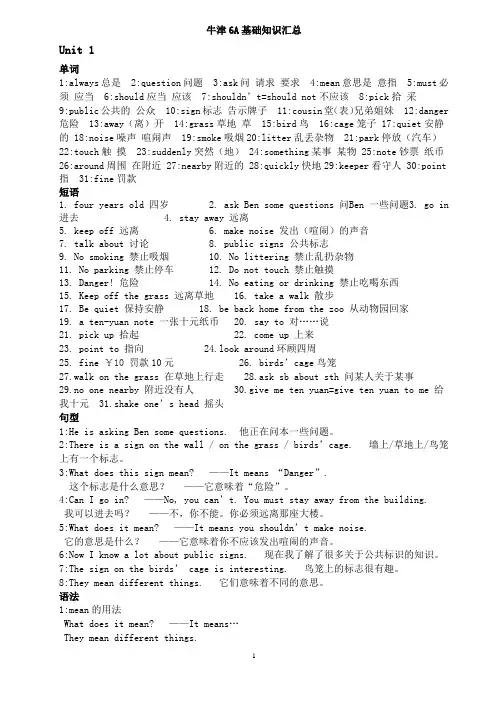
牛津6A基础知识汇总Unit 1单词1:always总是 2:question问题 3:ask问请求要求 4:mean意思是意指 5:must必须应当 6:should应当应该7:shouldn’t=should not不应该 8:pick拾采9:public公共的公众 10:sign标志告示牌子 11:cousin堂(表)兄弟姐妹 12:danger 危险 13:away(离)开 14:grass草地草 15:bird鸟 16:cage笼子 17:quiet安静的 18:noise噪声喧闹声 19:smoke吸烟20:litter乱丢杂物 21:park停放(汽车)22:touch触摸 23:suddenly突然(地) 24:something某事某物 25:note钞票纸币26:around周围在附近 27:nearby附近的 28:quickly快地29:keeper看守人 30:point 指 31:fine罚款短语1. four years old 四岁2. ask Ben some questions 问Ben 一些问题3. go in 进去4. stay away 远离5. keep off 远离6. make noise 发出(喧闹)的声音7. talk about 讨论 8. public signs 公共标志9. No smoking 禁止吸烟 10. No littering 禁止乱扔杂物11. No parking 禁止停车 12. Do not touch 禁止触摸13. Danger! 危险 14. No eating or drinking 禁止吃喝东西15. Keep off the grass 远离草地 16. take a walk 散步17. Be quiet 保持安静 18. be back home from the zoo 从动物园回家19. a ten-yuan note 一张十元纸币 20. say to 对……说21. pick up 拾起 22. come up 上来23. point to 指向 24.look around环顾四周25. fine ¥10 罚款10元 26. birds’cage鸟笼27.walk on the grass 在草地上行走 28.ask sb about sth 问某人关于某事29.no one nearby 附近没有人 30.give me ten yuan=give ten yuan to me 给我十元 31.shake one’s head 摇头句型1:He is asking Ben some questions. 他正在问本一些问题。
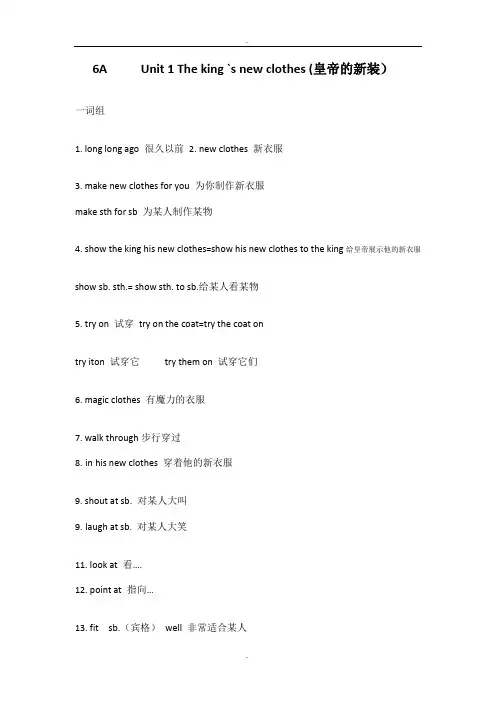
6A Unit 1 The king `s new clothes (皇帝的新装)一词组1. long long ago 很久以前2. new clothes 新衣服3. make new clothes for you 为你制作新衣服make sth for sb 为某人制作某物4. show the king his new clothes=show his new clothes to the king给皇帝展示他的新衣服show sb. sth.= show sth. to sb.给某人看某物5. try on 试穿try on the coat=try the coat ontry iton 试穿它try them on 试穿它们6. magic clothes 有魔力的衣服7. walk through步行穿过8.in his new clothes 穿着他的新衣服9. shout at sb. 对某人大叫ugh at sb. 对某人大笑11. look at 看….12. point at 指向…13. fit sb.(宾格)well 非常适合某人14.an American cowboy 一个美国牛仔wear jeans 穿牛仔裤15. a Scottish man 一位苏格兰人wear a kilt 穿苏格兰裙16.tell a story 讲一个故事tell sb. (宾格)a story 给某人讲故事17. say a/one sentence 说一句话say the next sentence 说下一句话18.on the mountain 在山上19. the next sentence 下一句话20.live in the house 住在房子里21. tell the boy a story 给这个男孩讲一个故事tell sb. sth.22. it is one `s turn 某人的机会23. think hard 努力思考24. have to 不得不have to +动原25. in front of 在….前面(外部)in the front of 在… 前面(内部)26. walk by 路过27. be nice to sb. 对某人好28. look after 照顾look after ...well=take good care of...照顾好29.turn into 变成30.a lot of people =many people 许多人二,句型1. Long long ago, there was a king. 很久很久以前,有一位国王。
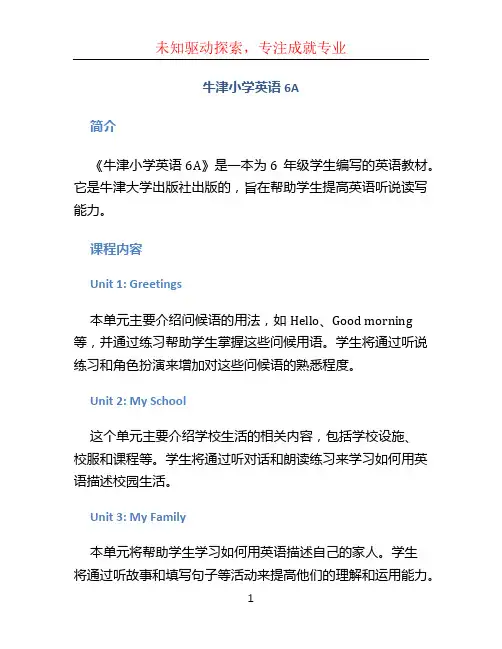
牛津小学英语6A简介《牛津小学英语6A》是一本为6年级学生编写的英语教材。
它是牛津大学出版社出版的,旨在帮助学生提高英语听说读写能力。
课程内容Unit 1: Greetings本单元主要介绍问候语的用法,如Hello、Good morning 等,并通过练习帮助学生掌握这些问候用语。
学生将通过听说练习和角色扮演来增加对这些问候语的熟悉程度。
Unit 2: My School这个单元主要介绍学校生活的相关内容,包括学校设施、校服和课程等。
学生将通过听对话和朗读练习来学习如何用英语描述校园生活。
Unit 3: My Family本单元将帮助学生学习如何用英语描述自己的家人。
学生将通过听故事和填写句子等活动来提高他们的理解和运用能力。
这个单元将帮助学生学习如何用英语谈论自己的爱好。
他们将通过学习一系列的对话和练习来表达他们的兴趣爱好。
Unit 5: Food and Drinks本单元将帮助学生学习食物和饮料方面的词汇。
学生将通过听和说的练习来提高他们的英语表达能力。
Unit 6: Festivals这个单元将向学生介绍一些重要的节日,如圣诞节、感恩节等。
学生将通过阅读和问答来提高他们的阅读和理解能力。
Unit 7: Our World本单元将帮助学生了解地球和环境保护的重要性。
学生将通过观察和讨论来增加他们对环境保护的认识。
Unit 8: Jobs这个单元将介绍一些不同的职业,如教师、医生、警察等。
学生将通过听音频和配对练习来提高他们的词汇记忆和理解能力。
本单元将向学生介绍一些常见的体育运动。
学生将通过观看视频和对话练习来学习如何用英语描述体育运动。
Unit 10: Our Future这个单元将帮助学生思考自己的未来,并学习如何用英语表达自己的目标和梦想。
学生将通过写作和朗读练习来提高他们的表达能力。
学术目标《牛津小学英语6A》旨在帮助学生达到以下学术目标:•提高听力技能:通过听对话、故事和音频来提高学生的听力理解能力。
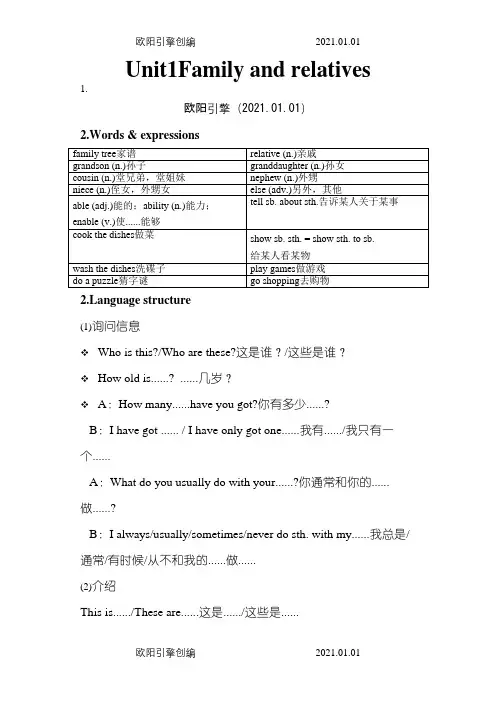
Unit1Family and relatives1.欧阳引擎(2021.01.01)2.Words & expressionsnguage structure(1)询问信息❖Who is this?/Who are these?这是谁?/这些是谁?❖How old is......? ......几岁?❖A:How many......have you got?你有多少......?B:I have got ...... / I have only got one......我有....../我只有一个......A:What do you usually do with your......?你通常和你的......做......?B:I always/usually/sometimes/never do sth. with my......我总是/通常/有时候/从不和我的......做......(2)介绍This is....../These are......这是....../这些是......(3)表示祝愿Happy birthday!生日快乐!(4)always, usually, often, sometimes, never等被称为频度副词,通常情况下常用于一般现在时态的句子中,表示经常发生的习惯性动作或自然现象或事实。
always表示动作的重复频率最高,usually其次,sometimes再次,never表示动作从未发生。
I often tell him about school.我经常告诉他关于学校的事。
I never show them my homework.我从未给他们看我的家庭作业。
(5)形容词比较级的用法:Your brother looks shorter than you.你的兄弟看上去比你矮。
Your uncle looks older than mine.你的叔叔看上去比我的叔叔年纪大。
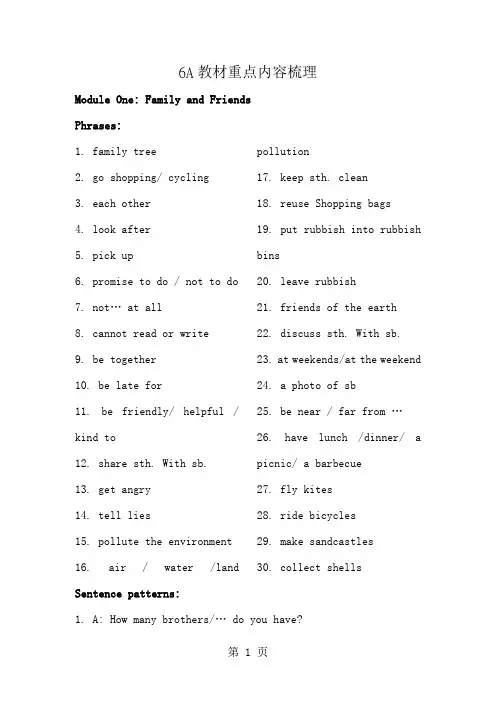
6A教材重点内容梳理Module One: Family and FriendsPhrases:1. family tree2. go shopping/ cycling3. each other4. look after5. pick up6. promise to do / not to do7. not… at all8. cannot read or write9. be together10. be late for11. be friendly/ helpful / kind to12. share sth. With sb.13. get angry14. tell lies15. pollute the environment16. air / water /land pollution17. keep sth. clean18. reuse Shopping bags19. put rubbish into rubbish bins20. leave rubbish21. friends of the earth22. discuss sth. With sb.23. at weekends/at the weekend24. a photo of sb25. be near / far from …26. have lunch /dinner/ a picnic/ a barbecue27. fly kites28. ride bicycles29. make sandcastles30. collect shellsSentence patterns:1. A: How many brothers/… do you have?B: I (only) have one brother.2. A: what do you do with your …?B: I always/usually/ sometimes play games with ….A: What else do you do with sb.?B: I sometimes … with …3. A: Have you been to …?B: I have just/already been to … / there. / I haven’t been to … /there yet.4. What about/How about + n./ving…?5. A: What do you usually do at weekends?B. I usually …6. A: Is … near or far away from …?B. It is near/ far away from….7. A: Where have you been?8. B: I have been to….9. Which place shall we visit?10. When shall we go there?11. What time?12. When are we going to come back?13. How are we going to get there?14. How much does it cost?Module Two: Places and ActivitiesPhrases:1. a bank clerk2. a shop assistant3. put out fires4. cook food5. make our city a safe place6. look at7. listen to8. arrive at9. have tea10. at the entrance11. on the ground/ first floor12. on the open day13. at half past eight in the morning14.First,../ Next,…/Then,…/After that,…/Finally, …15.take photos16. by ferry/ by underground/ on foot 17. on the bus18. go to school19. a lot of/ some/ a few20.live near/far away from school21.an advertisement board22. light rail23. a department store24. a housing estate25. a police station26. half an hour27. wait for28. walk on the grass29. keep quiet30. run across the road31. pick the flowers32. turn left/right33. on the right/left34. in the middle35. go upstairsSentence patterns:1.A: Would you like to be a/an…?B: Yes, I would.//No, I wouldn’t.A: Why?/Why not?B: I would /wouldn’t like to be a/an…because I…2.A: What would you like to be?B: I would like to be…3.A: Do you live near or far away from …?B: I live near/far away from ….A: How do you go to school?B: I go to school by…/on foot.A: How long does it take?B: It takes …4.A: How long does it take you to get to…?B: It takes me about…to get there.5.A: What does Simon see when he is walking to school?B: Simon sees ...when he is walking to school.6. What does this sign mean?7. We must not eat or drink./Don’t eat or drink.8. We must …9. A: Which escalator must we use?B: We must use the one in the middle.Module Three: Food and Drink phrases1. fried cabbage/chicken wings2. steamed prawns with garlic3. boiled eggs4. a shopping list5. at the vegetable stall6. in the frozen food section7. in the market/supermarket8. have a picnic9. a bottle of jam10. a packet of nuts11. a slice / slices of 12. an unhealthy diet13. do exercise14. live in the countryside15. stay with sb.16. plenty of / a lot of17. a little/ some18. my favourite breakfast19. too much spicy food20. eating habits21.the food pyramidSentence patterns:1.A: What would you like for dinner tonight?B: I’d like … for dinner.A: What kind of … would you like?Would you like … or …?B: I’d like…2.A: Have you bought any…?B: Yes, I’ve bought some…A: Where did you buy it/them?B: In the market, at the…stall/in the…section.A: How much was it/were they?B: It was /They were…yuan.3.A: Shall we buy some soft drinks?B: Ok./ That’s a good idea.4.Let’s buy some bread and a bottle of jam.Let’s go to the supermarket to buy some food and drink for the picnic.5.A: Would you like some…?B: No, thanks / yes, please6.A: Why do you like…?B: I like it/them because it’s/they’re sweet/delicious/tasty/spicy.7.A: Why not?B: I don’t want … because it is too ….8.A: May I have some …, please?B. Ok/ Sure/ All right/ Yes, you may. Here you are.//NO, youmay not./ I’m afraid you can’t..9.A: How much sugar do we need every day?B: We need a little sugar every day.10.A: Which one was healthier/less healthy?B: …’s diet was healthier than/less healthy than/as healthy as/as unhealthy as …’s diet.11.How much … do we need?12.What do you usually have for breakfast/ lunch /dinner?13.A: What did you have for breakfast yesterday?。
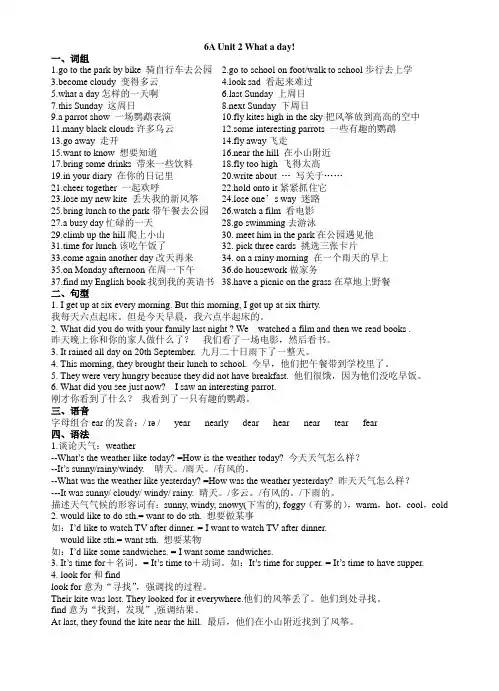
6A Unit 2 What a day!一、词组1.go to the park by bike 骑自行车去公园2.go to school on foot/walk to school步行去上学3.become cloudy 变得多云4.look sad 看起来难过5.what a day怎样的一天啊st Sunday 上周日7.this Sunday 这周日8.next Sunday 下周日9.a parrot show 一场鹦鹉表演10.fly kites high in the sky把风筝放到高高的空中11.many black clouds许多乌云12.some interesting parrots 一些有趣的鹦鹉13.go away 走开14.fly away飞走15.want to know 想要知道16.near the hill 在小山附近17.bring some drinks 带来一些饮料18.fly too high 飞得太高19.in your diary 在你的日记里20.write about …写关于……21.cheer together 一起欢呼22.hold onto it紧紧抓住它23.lose my new kite 丢失我的新风筝24.lose one’s way 迷路25.bring lunch to the park带午餐去公园26.watch a film 看电影27.a busy day忙碌的一天28.go swimming去游泳29.climb up the hill爬上小山30. meet him in the park在公园遇见他31.time for lunch该吃午饭了32. pick three cards 挑选三张卡片e again another day改天再来34. on a rainy morning 在一个雨天的早上35.on Monday afternoon在周一下午36.do housework做家务37.find my English book找到我的英语书38.have a picnic on the grass在草地上野餐二、句型1. I get up at six every morning. But this morning, I got up at six thirty.我每天六点起床。
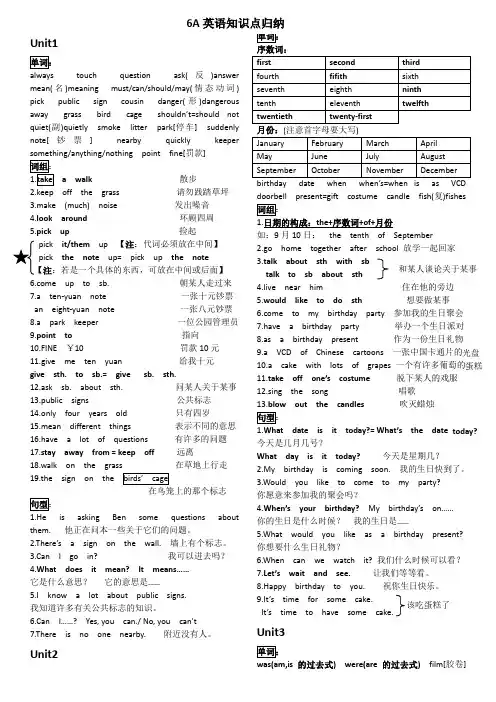
Unit1always touch question ask(反)answer mean(名)meaning must/can/should/may(情态动词) pick public sign cousin danger(形)dangerous away grass bird cage shouldn ’t=should not quiet(副)quietly smoke litter park[停车] suddenly note[钞票] nearby quickly keeper point fine[罚款]a walk 散步2.keep off the grass 请勿践踏草坪3.make (much) noise 发出噪音4.look around 环顾四周5.pick up 捡起pick it/them up 【注:代词必须放在中间】 pick the note up= pick up the note 注:若是一个具体的东西,可放在中间或后面】 e up to sb. 朝某人走过来 7.a ten-yuan note 一张十元钞票 an eight-yuan note 一张八元钞票 8.a park keeper 一位公园管理员 9.point to 指向10.FINE ¥10 罚款10元 11.give me ten yuan 给我十元 give sth. to sb.= give sb. sth.12.ask sb. about sth. 问某人关于某事 13.public signs 公共标志 14.only four years old 只有四岁15.mean different things 表示不同的意思 16.have a lot of questions 有许多的问题 17.stay away from = keep off 远离18.walk on the 在草地上行走 19.the sign on the在鸟笼上的那个标志1.He is asking Ben some questions about them. 他正在问本一些关于它们的问题。
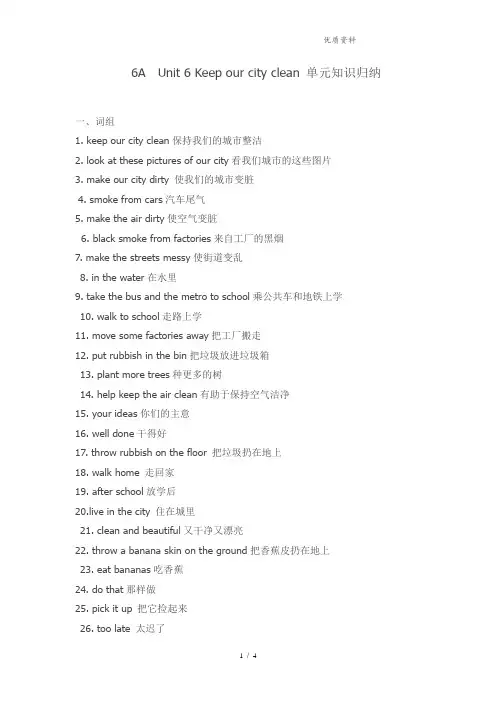
6A Unit 6 Keep our city clean 单元知识归纳一、词组1. keep our city clean保持我们的城市整洁2. look at these pictures of our city看我们城市的这些图片3. make our city dirty 使我们的城市变脏4. smoke from cars汽车尾气5. make the air dirty使空气变脏6. black smoke from factories来自工厂的黑烟7. make the streets messy使街道变乱8. in the water在水里9. take the bus and the metro to school乘公共车和地铁上学10. walk to school走路上学11. move some factories away把工厂搬走12. put rubbish in the bin把垃圾放进垃圾箱13. plant more trees种更多的树14. help keep the air clean有助于保持空气洁净15. your ideas你们的主意16. well done干得好17. throw rubbish on the floor 把垃圾扔在地上18. walk home 走回家19. after school放学后20.live in the city 住在城里21. clean and beautiful又干净又漂亮22. throw a banana skin on the ground把香蕉皮扔在地上23. eat bananas吃香蕉24. do that那样做25. pick it up 把它捡起来26. too late 太迟了27. slip on the banana skin在香蕉皮上滑倒28. go to hospital 去医院(看病)二、句子1. What makes the air dirty? 什么使空气变脏? Smoke makes the air dirty.烟雾使空气变脏。
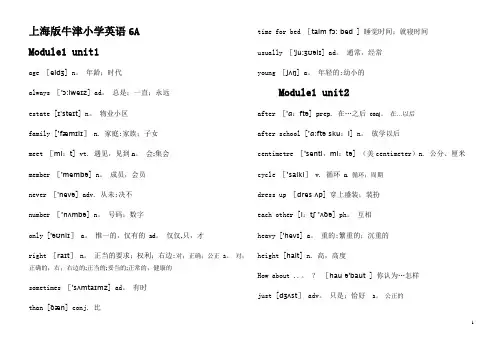
上海版牛津小学英语6AModule1 unit1age [eidʒ] n。
年龄;时代always ['ɔ:lweɪz] ad。
总是;一直;永远estate [ɪˈsteɪt] n。
物业小区family [’fæmɪlɪ] n. 家庭;家族;子女meet [mi:t] vt. 遇见,见到n。
会;集会member ['membə] n。
成员,会员never ['nevə] adv. 从未;决不number [’nʌmbə] n。
号码;数字only ['əʊnlɪ] a。
惟一的,仅有的ad。
仅仅,只,才right [raɪt] n。
正当的要求;权利;右边;对;正确;公正a。
对;正确的;右;右边的;正当的;妥当的;正常的;健康的sometimes ['sʌmtaɪmz] ad。
有时than [ðæn] conj. 比time for bed [taim fɔ: bed ] 睡觉时间;就寝时间usually ['ju:ʒʊəlɪ] ad。
通常,经常young [jʌŋ] a。
年轻的;幼小的Module1 unit2after ['ɑ:ftə] prep. 在…之后conj。
在…以后after school [’ɑ:ftə sku:l] n。
放学以后centimetre ['senti,mi:tə] (美centimeter)n. 公分、厘米cycle [’saikl] v. 循环n. 循环;周期dress up [dres ʌp] 穿上盛装;装扮each other [i:tʃ’ʌðə] ph。
互相heavy ['hevɪ] a。
重的;繁重的;沉重的height [hait] n. 高,高度How about ..。
?[hau ə'baut ] 你认为…怎样just [dʒʌst] adv。
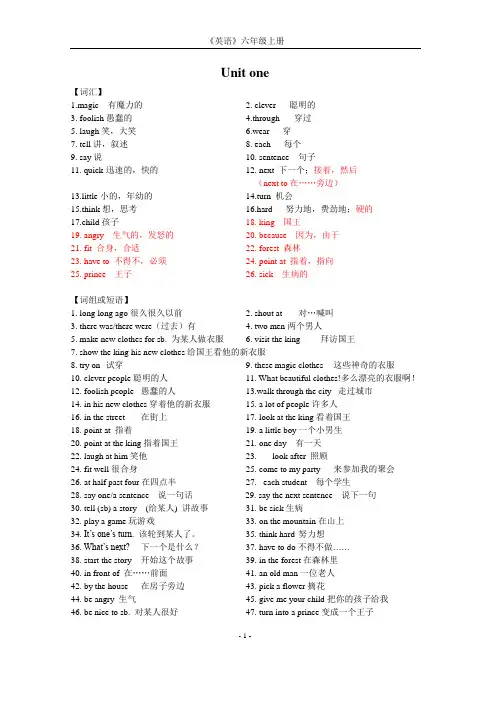
Unit one【词汇】1.magic 有魔力的2. clever 聪明的3. foolish愚蠢的4.through 穿过5. laugh笑,大笑6.wear 穿7. tell讲,叙述8. each 每个9. say说10. sentence 句子11. quick 迅速的,快的12. next 下一个;接着,然后(next to在……旁边)13.little小的,年幼的14.turn 机会15.think想,思考16.hard 努力地,费劲地;硬的17.child孩子18. king 国王19. angry 生气的,发怒的20. because 因为,由于21. fit 合身,合适22. forest 森林23. have to 不得不,必须24. point at 指着,指向25. prince 王子26. sick 生病的【词组或短语】1. long long ago很久很久以前2. shout at 对…喊叫3. there was/there were(过去)有4. two men两个男人5. make new clothes for sb. 为某人做衣服6. visit the king 拜访国王7. show the king his new clothes给国王看他的新衣服8. try on 试穿9. these magic clothes 这些神奇的衣服10. clever people聪明的人11. What beautiful clothes!多么漂亮的衣服啊!12. foolish people 愚蠢的人13.walk through the city 走过城市14. in his new clothes穿着他的新衣服15. a lot of people许多人16. in the street 在街上17. look at the king看着国王18. point at 指着19. a little boy一个小男生20. point at the king指着国王21. one day 有一天22. laugh at him笑他23. look after 照顾24. fit well很合身25. come to my party 来参加我的聚会26. at half past four在四点半27. each student 每个学生28. say one/a sentence 说一句话29. say the next sentence 说下一句30. tell (sb) a story (给某人) 讲故事31. be sick生病32. play a game玩游戏33. on the mountain在山上34. It’s one’s turn.该轮到某人了。
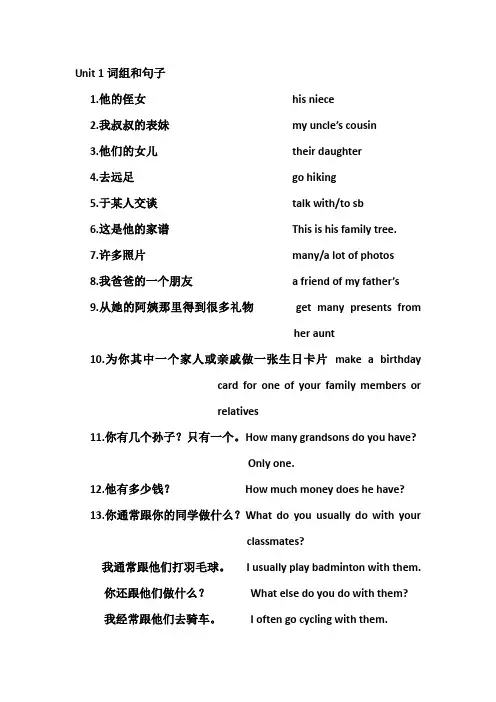
Unit 1词组和句子1.他的侄女his niece2.我叔叔的表妹my uncle’s cousin3.他们的女儿their daughter4.去远足go hiking5.于某人交谈talk with/to sb6.这是他的家谱This is his family tree.7.许多照片many/a lot of photos8.我爸爸的一个朋友 a friend of my father’s9.从她的阿姨那里得到很多礼物get many presents fromher aunt10.为你其中一个家人或亲戚做一张生日卡片make a birthdaycard for one of your family members orrelatives11.你有几个孙子?只有一个。
How many grandsons do you have?Only one.12.他有多少钱?How much money does he have?13.你通常跟你的同学做什么?What do you usually do with yourclassmates?我通常跟他们打羽毛球。
I usually play badminton with them.你还跟他们做什么?What else do you do with them?我经常跟他们去骑车。
I often go cycling with them.14.祝你生日快乐!Happy birthday to you!15.你跟他是什么关系?What’s the relationship with him?他是我的堂兄。
He is my cousin.16.我爷爷经常去饭店。
My grandfather often goes to therestaurant.17.家谱family tree18.家庭成员family member19.你要呆在那里多长时间how long will you stay there?20.你还要多久回来how soon will you come back?21.你多久玩一次游戏how often do you play games?22.我也有一个阿姨I have one aunt, too. = I also have one aunt.23.逛街go shopping24.去骑车go cycling25.去滑雪go skiing26.去游泳去钓鱼go swimming/ fishing27.踢足球,打篮球/羽毛球/排球/乒乓球play football/ basketball/ badminton/ volleyball/ tennis28.弹钢琴/拉小提琴/弹吉他play the piano/ violin/ guitar29.去餐厅go to a restaurant30.看电视/看电影watch TV watch a film31. 有牛奶/ 没有牛奶There is a lot of milk . There isn’t much milk.。
Unit 1 Public signs 一词组和日常用语No smoking 禁止吸烟No littering 禁止乱扔杂物No parking 禁止停车Do not touch 禁止触摸Danger!危险No eating or drinking 禁止吃喝keep off the grass 禁止践踏草坪Be quiet 保持安静keep quiet保持安静his cousin 他的表弟on the wall在墙上go in入内a lot of questions许多问题ask sb. some questions about sth.问某人一些有关某事的问题only four years old仅仅四岁a lot of public signs许多公共标志mean different things意味着不同的意思walk on the grass在草地上走make noise发出喧闹的声音know a lot about public signs知道许多有关公共标志的知识the sign on the birds’ cage在鸟笼上的标志climb the tree爬树stay away from the building远离那座建筑物at home在家give me ten yuan给我十元take a walk 散步take photos拍照see something on the grass看见草地上有些东西a ten yuan note一张十元纸币look around看看四周walk to the note走向纸币pick it up 拣起它pick up your pencil拣起你的铅笔come up to him来到他面前a park keeper一个公园管理员point to a sign on the grass指着草地上的一个标志the boy in the green sweater穿着绿色毛衣的男孩shake one’s head摇头on the Internet在网上二.句子1. What does this sign mean? It means ‘No smoking’.It means you shouldn’t smoke.这个标志什么意思?它意味着“禁止吸烟”。
Unit 1 The king’s new clothes1. long long ago 很久以前2. new clothes 新衣服3. make new clothes for you 为你制作新衣服make sth for sb4. show the king his new clothes 给皇帝展示新衣服show sb. sth.= show sth. to sb.5. try on 试穿6. magic clothes 有魔力的衣服7. walk through 步行穿过8. in his new clothes 穿着他的新衣服9. shout at sb. 对某人大叫10. laugh at sb. 对某人大笑11. look at 看…. 12. point at 指向…13. fit well 非常适合14. an American cowboy 一个美国牛仔15. a Scottish man 一位苏格兰人16. tell a story 讲一个故事17. say a/one sentence 说一句话18. on the mountain 在山上19. the next sentence 下一句话20. live in the house 住在房子里21. tell the boy a story 给这个男孩讲一个故事tell sb. sth.22. it is one’s turn 某人的机会23. think hard 努力思考24. have to 不得不have to do sth.25. in front of 在….前面(外部)in the front of 在…前面(内部)26. walk by 路过27. be nice to sb. 对某人好28. look after 照顾29. turn into 变成。
Unit one【词汇】1.magic 有魔力的2. clever 聪明的3. foolish愚蠢的4.through 穿过5. laugh笑,大笑6.wear 穿7. tell讲,叙述8. each 每个9. say说10. sentence 句子11. quick 迅速的,快的12. next 下一个;接着,然后(next to在……旁边)13.little小的,年幼的14.turn 机会15.think想,思考16.hard 努力地,费劲地;硬的17.child孩子18. king 国王19. angry 生气的,发怒的20. because 因为,由于21. fit 合身,合适22. forest 森林23. have to 不得不,必须24. point at 指着,指向25. prince 王子26. sick 生病的注:红色单词为旧教材3A——5B没有的而本课中出现的词汇。
【词组或短语】1. long long ago很久很久以前2. shout at 对…喊叫3. there was/there were(过去)有4. two men两个男人5. make new clothes for sb. 为某人做衣服6. visit the king 拜访国王7. show the king his new clothes给国王看他的新衣服8. try on 试穿9. these magic clothes这些神奇的衣服10. clever people聪明的人11. What beautiful clothes!多么漂亮的衣服啊!12. foolish people 愚蠢的人13.walk through the city 走过城市14. in his new clothes穿着他的新衣服15. a lot of people许多人16. in the street 在街上17. look at the king看着国王18. point at 指着19. a little boy一个小男生20. point at the king指着国王21. one day 有一天22. laugh at him笑他23. look after 照顾24. fit well很合身 25. come to my party 来参加我的聚会26. at half past four在四点半27. e ach student 每个学生28. say one/a sentence 说一句话29. say the next sentence 说下一句30. tell (sb) a story (给某人) 讲故事31. be sick生病32. play a game玩游戏33. on the mountain在山上34. It’s one’s turn.该轮到某人了。
1 Unit 1 Public signs 单词:(30’) cousin堂(表)兄弟姐妹, question问题, public公共的, sign标志, mean意思是, bin箱子danger危险, must必须, away(离)开, grass草, off脱离,(离)开, cage笼子, quiet安静, noise噪声, know知道, conversation对话, complete完全的, smoke吸烟, litter乱丢, cycle骑自行车, back回, suddenly突然地, note钞票,纸币, match比赛, around在周围,四面, nearby附近的, keeper看守人, point指出, fine罚款, rubbish废物, 词组: 1. 禁止停车 No parking 2. 禁止吸烟 No smoking 3. 禁止吃喝 No eating or drinking 4. 禁止践踏 keep off the grass 5. 禁止乱丢杂物 No littering 6. 禁止触摸 Do not touch 7. 安静Keep / Be quiet 8. 朝他走去 come up to him 9. 罚款5元 FINE ¥5 10. 在鸟笼上 on the birds’ cage 11. 指向 point to 24. 进去 go in 12. 只有四岁 only four years old 13. 有许多问题 have a lot of questions 14. 问问题 ask question 15. 公共标志 public signs 16. 禁止骑车 No cycling 17. 在危险中 in danger 18. 制造噪音 make noise 19. 散步 take a walk 20. 走向纸币 walk to the note 21. 一个公园看守员 a park keeper 22. 环顾 look around 23. 在草地上走 walk on the grass 25. 建筑物上的标志 the sign on the building 26. 远离 stay away from 句型: 1. 这个标牌是什么意思? What does this sign mean? 它意指“危险”。 It means “Danger”. 2.那个标牌什么意思? What does that sign mean? 它意指你不应该在草地上走。 It means you shouldn’t walk on the grass. 3.它是什么意思? What does it mean? 它意指你应该远离建筑物。 It means you should stay away from the building. 4.我现在可以看电视了吗? Can I watch TV now? 不,你不可以。你应该先做你的家庭作业。 No, you can’t. You should do your homework first. 5.杰克只有四岁,但他总是有许多问题要问。 Jack is only four years old, but he always has a lot of questions. 6.他正在问本一些有关公共标志的问题。 He is asking Ben some questions about public signs. 7.我可以进去吗? Can I go in? 不,你不可以。你必须远离这座建筑物。 No, you can’t. You should stay away from the building. 部分语言点解析 1.动词如果在No后表示禁止做某事,动词要用ing形式,如:No swimming; 如果前面是don’t 或者do not后面跟动词原形,如:Do not touch. 2.must, would, should (shouldn’t), can,may的区别 must 表示必须一定做到的事情;would表示想要做的事情,would like to do sth. 2
should(shouldn’t)表示应该或不应该;can表示能够,会做某事;may表示可以或允许做某事。must, should shouldn't, can, may都是情态动词,后面都跟动词原形。 Unit 2Ben’s birthday 词组: 1.本的生日 Ben’s birthday 2.一起回家 go home together 3. 十月16号 the sixteenth of October 4.拜访某人 visit somebody( sb.) 5. 谈论某事talk about something (sth.) 6. 和某人谈话 talk to/with somebody(sb.) 7. 日本卡通片Japanese cartoons 8. 作为一个生日礼物 as a birthday present 9. 举行生日聚会 have a birthday party 10. 祝你生日快乐 Happy birthday to you ! 11. 等会儿看 wait and see 12. 脱掉你的鞋 take off your shoes 13. 吹灭蜡烛 blow out the candles 14. 在本的生日聚会上 at Ben’s birthday party 15. 通过电话 on the phone 16. 一个大生日蛋糕 a big birthday cake 17. 做张生日贺卡 make a birthday card 18. 一张纸 a piece of paper 19. 在海湾 in the bay 20. 中国的新年 Chinese New Year 21.在日历上 on the calendar 22. 马上到 come soon 23.一张纸 a piece of paper 24. 写信息write a message 25. 一大早early in the morning 26. 在海滨 in the bay 句型: 1)今天几号? What date is it today? 今天是九月二十三号。 It’s the twentieth-third of September.、 2)你何时过生日? When’s your birthday? 我的生日是十月十八号。 My birthday’s on the eighteenth of October. 3)你想要什么东西作为生日礼物? What would you like as a birthday present? 我想要一个日本卡通片的光盘。 I’d like a VCD of Japanese cartoons. 5)你们经常举行生日聚会吗? Do you often have a birthday party? 6)本正和他的家人讨论关于他的生日聚会的事。Ben is talking to his family about his birthday party. 8)本吹灭了蜡烛上的蛋糕。 Ben blows out the candles on the cake. 9)阿拉丁正脱掉他的戏服。 Aladdin is taking off his costume. 部分语言点解析 (1)I’d like=I would like 我想要某物 === I want… I’d like to = I would like to 我想要做某事 == I want to … would like 想要的意思。可用于表示邀请,后面如果加动词用would like to +动词原形 例 1 I’d like some balloons. →Would you like some balloons? =I want some balloons . → Do you want some balloons ? 2 I’d like to watch TV . → Would you like to watch TV? =I want to watch TV . → Do you want to watch TV?
(2)介词in. on at的用法 in表示:“段”时间,常用在年份,月份,季节前, 也用在上午,下午和晚上前。 3
例如:in 1997 在1997年 in spring 在春季 in May 在五月 in the moring 在上午 in the afternoon 在下午 in the evening 在晚上 on 表示具体的某一天,常用在星期,具体的一天前。 例如:on Monday 在星期一 on the first of March 在三月一日 at 用在时刻前 例如:at ten o'clock在十点钟
Unit 3 It was there!
单词: 1.was (am,is 的过去式) 2.excited 激动的,兴奋的 3.monent 片刻,瞬间 4.ago 以前 5.were (are 的过去式) 6.glasses 眼镜 7.camera 照相机 8.CD Walkman 光盘随声听 9.roll 卷,卷状物 10.film 胶卷 11.ground 地面 12.exciting 令人激动的,令人兴奋的 13.earphone 耳14.diary 日记,日记簿 15.remember记住,记得 16.weren’t=were not 17.mobile phone 手机,手提电话 18.race 比赛
词组: 1. Sports Day 体育运动日 2. all the students 所有的学生 3. watch a running race 观看赛跑 4. very excited 非常的兴奋 5. look for 寻找 6. very exciting 非常的令人兴奋 7. a moment ago 一会儿前 8.let me see 让我看看 9. just now 刚才 10. on the ground 在地上 11. pick them up 把它们捡起来 12. can’t find 找不到 13. want to know 想知道 14. behind the door 在门后面 15. a pair of glasses 一副眼镜 16. a roll of film 一卷胶卷 17. beside the copybooks on your desk 在你桌子上的抄写本旁 18. try to remember 试着记住